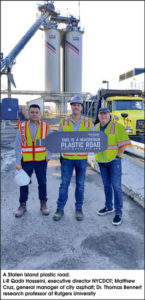Plastics
Staten Island is now home to the first public roads in New York to be created using waste plastic, following a partnership between New York City Department of Transportation (NYC DOT) and British waste plastic road company MacRebur.
The two roads, located on Rice Avenue and Royal Oak Road, form the first stages of a revolutionary trial that sees otherwise unrecyclable plastics re-engineered into a new, high quality, sustainable polymer and given a new lease of life within asphalt mix in road construction.
The new eco-friendly surfaces have saved over 7,331kg of CO2e in comparison to traditional asphalt and diverted the equivalent weight of 214,534 single use plastic bottles from landfill.
Taking place over four days, MacRebur and NYC DOT have worked with asphalt producer City Asphalt to lay four different types of asphalt mix, using over 2,400 tons of hot mix asphalt.
While the first mix contains solely traditional asphalt, the remaining three each consist of asphalt mixed with a percentage of MacRebur’s waste plastic additive, which replaces part of the bitumen (fossil fuel) binder.
The trial sections will now be tested and monitored to measure performance against traditional asphalt by Dr Thomas Bennert at Rutgers University – one of the leading U.S. universities in asphalt research and testing, with results expected before the end of the year.
Roddy McEwen, international business officer at MacRebur, said, “Having worked with the team at NYC DOT for just over a year, it’s refreshing to see such enthusiasm about new technology and products for use in asphalt.
“While trials sections such as these typically take up to three years from start to finish, we have worked together to begin trials within just four months – with a long-term goal of utilizing local waste for local roads.”
Producing and laying 1.1 million tons of asphalt each year, NYC DOT is one of the U.S. leaders in using recycling asphalt pavement, and typically use 40 percent in every mix.
Ydanis Rodriguez, NYC DOT commissioner, said: “Using recycled plastic waste has the potential to solve our growing plastic waste problem and improve the quality of our streets by cutting carbon emissions and reducing potholes.
Published in the December 2022 Edition







